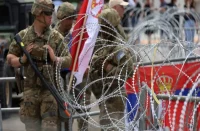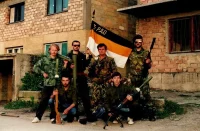Pyotr ISKENDEROV (Russia)
The focal point of the US, EU, and NATO politics is steadily drifting east. The agendas of the architects of the new world order for the May 28 – June 2 NATO Parliamentary Assembly session and the Bilderberg Club conference opening on June 4 are topped by the themes of Transcaucasia, Iran, Afghanistan, and the energy security.
The strategy leads the West both to revamp its policies with respect to Russia and to preemptively resolve the existing problems which can put obstacles in the way of the onslaught east. While the economic crisis in the south of the EU is largely left to evolve as a natural phenomenon, the Balkan region – an area sensitive from the standpoint of Europe’s interests – is clearly believed to require urgent sanation. The main efforts will be aimed at suppressing the resistance mounted by Serbia and the Serbian community in Kosovo to the independence of the breakaway province, at the dismantling of Republika Srpska in Bosnia and Herzegovina, and at the irreversible involvement of all of the Balkan republics with the models of integration into the EU which require that they shed sovereignty in foreign politics and the military sphere. Accomplishing the objectives will make it possible for the West to switch to the problems of Transcaucasia, Central Asia, and Middle East without promising clearly to admit Albania and the republics of the former Yugoslavia to the EU and NATO. At the same time, the West will be able to either ignore or invoke to its own advantage the precedents set by the Balkan developments and the analogies with the region’s recent history.
The available information warrants the conclusion that at least at the moment – thanks to the firmness of the Serbs of Kosovo, Serbia’s and Russia’s support for their position, and the uncertainty of the situation around the UN world court’s verdict on Kosovo – Albanians are unlikely to resort to force in the northern part of Kosovo. Pristina’s undeclared consent to the May 30 Serbian municipal elections in Kosovska Mitrovica and Novo Brdo can be regarded as indirect evidence supporting the above hypothesis. The elections were held in accord with the December 24, 2009 decision made by the government of Serbia. Though Albanian radicals called the Kosovo administration to prevent the elections at any cost, decrying them as a threat to “the sovereignty and territorial integrity” of Kosovo, the Albanian reaction has been limited to loud statements and rallies. Hashim Thaci’s government said it would ignore the elections in Kosovska Mitrovica and Novo Brdo but would rather not “provoke tensions and destabilize the situation” by taking specific measures. EU special representative in Kosovo Pieter Feith only confirmed that the EU would not recognize the outcome of the elections, which was in fact redundant information.
Having to an extent suffered a defeat in Kosovo, the Western centers of power are going to tighten their policies with respect to Bosnia and Herzegovina and target Republika Srpska. The Sarajevo EU-Balkan summit scheduled for June 2 will attempt to find a way of eliminating the Serbian republic. The July 11 commemoration of the Srebrenica tragedy which the West describes without any evidence as a genocide against Bosnian Muslims will provide a propaganda backing for the anti-Serbian campaign. The 15th anniversary played out on the remnants of victims of an alleged genocide would serve as a timely expression of support for the elimination of Republika Srpska.
Are Serbia, the Serbian nation, and Russia ready to resist the implementation of the Bosnian scenario at least to the same extent as they do in the case of Kosovo? Sadly, there are serious doubts that they are. Since 1995 Russia has been a member of the Dayton Agreements committee. On the one hand, the status opens to it opportunities to voice its position internationally. On the other, Moscow has no right of veto in the body and has to synchronize its positions with its peers – the NATO and EU countries and the Organization of Islamic Conference. The arrangement reduces Russia’s potential to pursue an independent and active politics of support for Republika Srpska. The absence of Russia’s representatives at the consultations on the constitutional reform in Bosnia and Herzegovina which took place in October, 2009 at NATO’s Butmir airbase near Sarajevo highlighted the fact. The Russian diplomacy’s key thesis in the context of the settlement in Bosnia and Herzegovina – that the International High Representative’s office in the post-Yugoslavian republic should be closed as soon is possible – actually appears contradictory. Without being combined with an uncompromising demand to guarantee the preservation of the Serbian ethnic formation in Bosnia and Herzegovina, it translates into the suggestion to vest undivided authority in the Sarajevo Muslim administration, a reform promising trouble to the Bosnian Serbs (and, to a lesser extent, Croats).
As for the government of Serbia, at present we are witnessing its de facto capitulation in dealing with the whole range of the Balkan problems (except for the status of Kosovo) under the pretexts of the integration into the EU and of regional reconciliation. The process manifested itself during the May 29 Sarajevo meeting of the leaders of the countries of the so-called Igman Initiative floated a decade ago to build trust between nations. The statements Serbian president Boris Tadic made in the presence of the leaders of Croatia Ivo Josipovic, of Montenegro Filip Vujanovic, and of Bosnia and Herzegovina Haris Silajdzic were ambiguously worded if not openly defeatist. The main idea contained in the Serbian president’s statement was that Serbia “respects the territorial integrity” of Bosnia and Herzegovina, Croatia, and Montenegro. Such readiness to comply with the international law could otherwise be welcomed, but it had to be taken into account that Zagrb and Podgorica had recognized the independence of Kosovo, clearly at the expense of the territorial integrity of Serbia. As for Bosnia and Herzegovina, it would have done the same a long time ago had it not been for the right of veto retained by the Bosnian Serbs. In any case, an advocate of Albanian extremism more vocal than Haris Silajdzic would be hard to find in Sarajevo. Tadic’s pledge of allegiance to the territorial integrity of Croatia and Bosnia and Herzegovina appear strange considering that the Bosnian Serbs are determined to strengthen their ties to Serbia and that the republic of Serbian Krajina was butchered in Croatia in 1995. Tadic could at least address the issues at the summit and demand that his counterparts take real steps to protect the interests of the respective Serbian communities, which he did not bother to do. Instead, a lot of attention was given to the West’s favorite story of Srebrenica. Tadic said that – to demonstrate adherence to European values and to promote the Balkan reconciliation – Serbia would maximize its cooperation with the Hague Tribunal which is putting Serbs on trial for genocide they have never perpetrated. Tadic promised to visit Srebrenica this July, while no serious evidence or documents shedding light on what was happening there 15 years ago have been presented up to date. No doubt, Tadic’s address earned him the gratitude of Silajdzic, a field commander of the Bosnian Muslims in 1992-1995, who famously stated that Republika Srpska as a product of ethnic cleansing has no right to exist.
Tadic almost certainly realizes that the things he says help the enemies of Serbs. His conduct invites the hypothesis that his position is built into a broader scenario by which Belgrade intends to accelerate Serbia’s integration into the EU and at the same time to ease the tensions around Kosovo. It is a problem, however, that the only roles the Balkan countries and their leaders have ever played in geopolitics were those of pawns, and appeasing the real aggressors, instigators of genocide, and organizers of ethnic cleansing and war crimes only paves a way for new atrocities. Evidently, the Bosnian Serbs are already nominated as the next sacrifice.
Source: Strategic Culture Foundation
The views expressed may not coincide with those of ORIENTAL REVIEW.














if you get this message.. fight for youe freedoms..dont hand them over squat..freedom is more precious than gold
Pingback: Balkans in the Nets of the New World Order (I) | Oriental Review